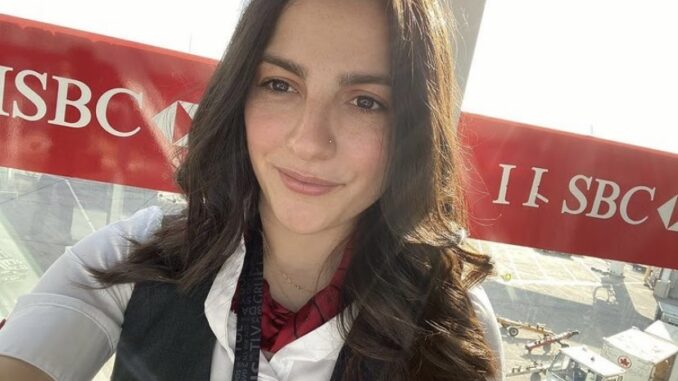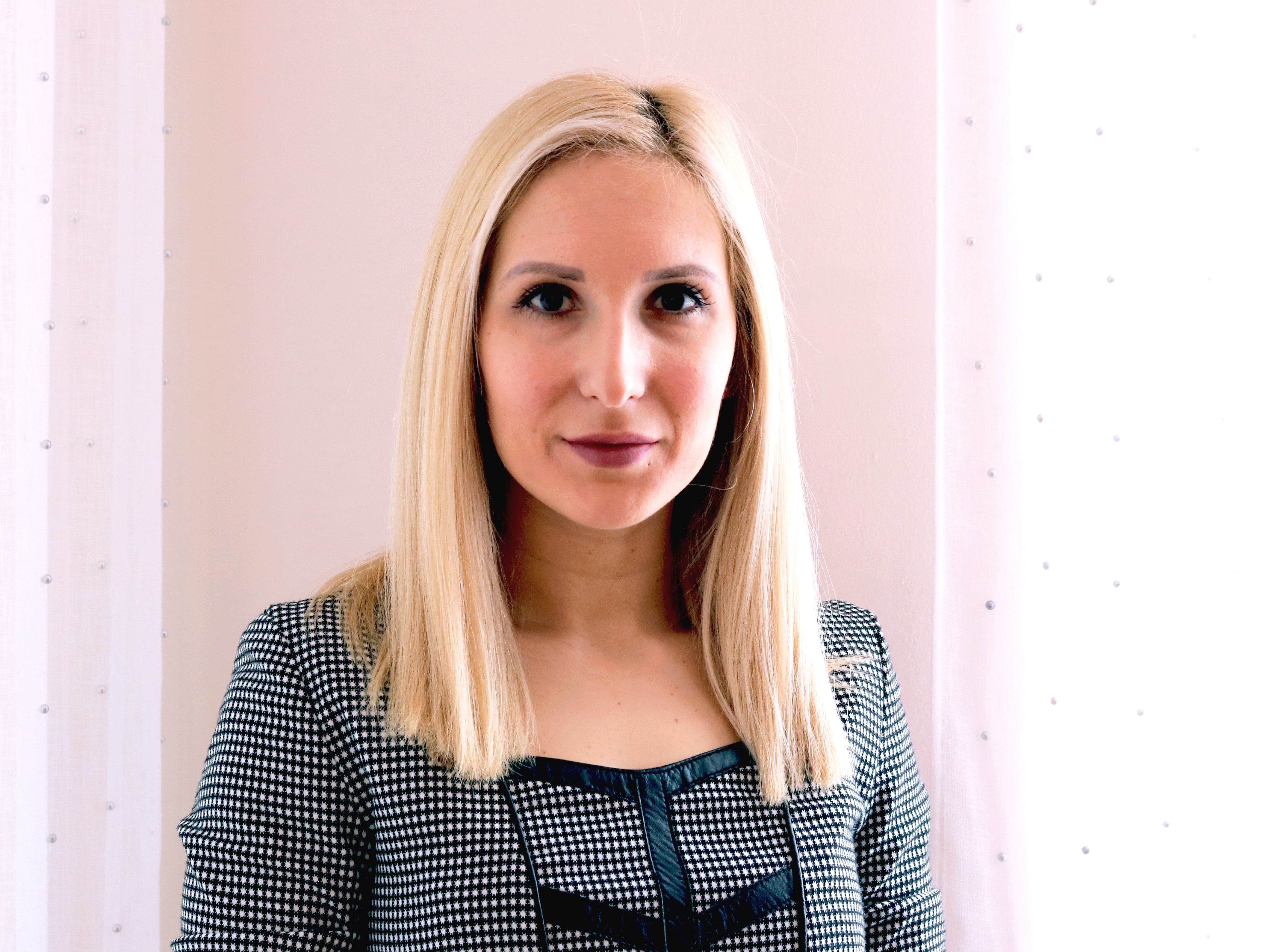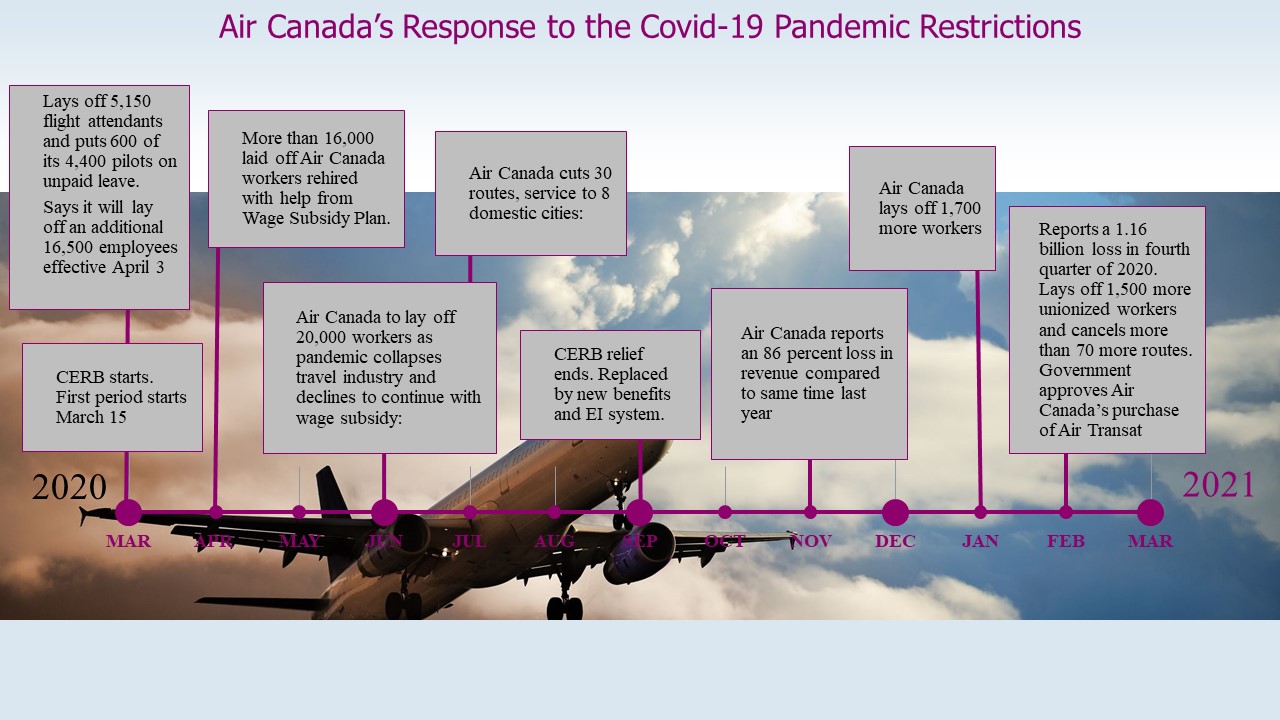
WHEN PASSION MEETS A PANDEMIC, IT DOESN’T GO WELL
Ayah Elsalkh, 26, describes herself as a workaholic and a person who loved her job so much that she always picked up extra shifts. Elsalkh is a former Customer Service and Specialist Agent at Air Canada. She says she had to sacrifice both time and money to fight for her dream job in her chosen profession.
“There are some people at Air Canada that have 30 years experience. I only have three. So I knew I was going to be laid off…but if you volunteer you get to keep your medical benefits.”
Elsalkh says that working for Air Canada was her dream for years.
“I spent over a year applying for it and getting denied and denied and denied and rejected until they actually hired me as a temp. So seasonal. And I quit my job, which was actually in my field. I was a pastry chef at a restaurant at the time… I’m like, I’m going to impress them so much that they’re going keep me. And they did. So honestly, it meant a lot. It’s my passion in life,” says Elsalkh.
Air Canada sent out an email stating that they will be laying off employees based on seniority bases.
Elsalkh says that Air Canada told her that if an employee chooses the volunteer lay-off, they will keep their vision care, health care, dental, discounted/free flights, and most importantly, their recall rights.
According to union rules, recall rights mean that Air Canada cannot hold job interviews or hire another employee until they offer Elsalkh her job back. Elsalkh says that her three-year employment at the company gives her up to five years of recall rights.
She says that Air Canada also said that if they didn’t receive a certain amount of volunteer layoffs, they would have begun dismissing employees without granting them any benefits.
To Elsalkh, the choice was clear.
THE PANDEMIC AND THE AIRLINE INDUSTRY
MONEY, MONEY, MONEY
John Gradek is a Coordinator of the Aviation Management program at McGill University and an expert consultant for Transport Canada. He says that the greatest challenge airlines are facing during the Covid-19 pandemic is an obvious one: no revenue. But revenue is detrimental because, he says, airlines are “a high-fixed-costs business.”
The best way to understand how revenue impacts an airline is by looking at their “break-even” metric.
“How many people you need in those planes so you can break even on the cost? Air Canada…needs at least 80% of their planes full in order to cover just the cost of operation.”
MORE IN THE NUMBERS
This month, Air Canada released their 2020 revenue report. The report reveals the financial devastation the airline experienced throughout the year.
In 2019, Air Canada’s financial revenue that they used to operate with was $19, 131 million, while the income they used to operate with was $1,650 million. In 2020, their operation revenue dropped almost four times to $5,833 million, while their operating income turned into a loss of $3, 766 million.
Their operating income has remained in the negatives, with the highest losses reported in the quarter of April-June during the pandemic’s initial lockdown in Canada. During the third quarter of the year – July to September – Air Canada had decreased their losses, most likely due to the major layoffs that it has been introducing since April. But in late fall and early winter of 2020, Air Canada reported operating income losses that are closer to the ones when the pandemic lockdown began in spring.
Their 2020 Quarterly breakdown shows that their operating revenue has been decreasing each quarter of the year steadily.
HOW DOES THIS LOOK LIKE IN ACTION?
Gradek says that as a result, for Air Canada and other airlines their priority has become to lose the least amount of money possible rather than generate income. That is only possible through reducing their costs as best as they can.
“They have a whole bunch of tactics to do that,” says Professor Gradek. “They have taken half of their fleet and have parked them in deserts all over the world. They have put their planes away. They are flying about 100 planes out of a fleet of 240.”
“What’s going on with the business since then? It hasn’t gotten any better. It’s gotten worse.”
WHAT DO AIRLINES DO TO STAY AFLOAT?
They begin to convert their business.
“No longer going back to passenger. Flights to Hongkong, Frankfurt, Zurich, London are being flown as freighters.”
Gradek says that naturally, after parking the fleet or converting their airplanes into freighters, the airline had no other choice but to begin letting go of its employees.
THE PANDEMIC AND THE EMPLOYEES
UNEMPLOYMENT NUMBERS 2020
Between January of 2020 and January of 2021, Statistics Canada reports a stark increase in unemployment numbers. Shortly after the lockdowns, April was the first sharp increase in the unemployment rate, as many companies had mass layoffs.
Elsalkh was caught in the vortex as the travel industry was hit hard. Throughout the year, there were fluctuations in the rate as different restrictions and lockdowns came and went, affecting different industries. Even still the numbers remained much higher than the beginning of the year and the average of previous years. The employment rate of Ontario fluctuated consistently with the national numbers, although it was consistently higher for most months.
According to the Financial Accountability Office of Ontario, 355,300 jobs were lost due to the pandemic shutdown – the largest annual recorded loss. The report also states that the annual unemployment rate of 9.6 percent is the highest since 1993.
The transportation industry saw a loss of 12.9 percent which numbered 47,900 jobs.
WHAT DOES THIS MEAN FOR AIRLINE EMPLOYEES?
Gradek says that Air Canada hasn’t done a good job of addressing the uncertain recall timelines.
“They are not clear when the recall will happen: is it this year? Next year? 2023? Individuals who are on recall don’t know how long they will wait. That’s really tough to do if you’ve got family, financial obligations, and your career is on hold, waiting for Air Canada to call you back,” says Gradek.
“I am worried that I may never get recalled. I am worried that by the time I get recalled I would have started another job based on what’s going on.”
Other questions Gradek asks:
- How are they going to recall their employees?
- What’s the order of the recall?
- Are they going to recall those that are most senior or junior?
Elsalkh’s uncertainty also grows.
“Every year we get a pay increase based on years of service. Are those pay increases going to be applied once I get back?”
THE ANSWER: PENDING
We reached out to the Executive Vice President of Human Resources at Air Canada, Arielle Meloul-Wechsler, to comment on these questions. But we never heard back.
However, Toronto employment lawyer Muneeza Sheikh says that if Aya doesn’t receive a recall invitation by the end of her layoff period, her severance payment won’t be more than a few weeks.
In other words, it won’t be much at all.
Sheikh also says that Air Canada can work with Aya’s union and offer her an extension of her benefits or layoff period altogether. After all, she says that Air Canada’s decision to lay off employees is also of service to them.
“I don’t think this approach really saves them any money but what it does is that it creates a better and less demoralized workforce,” says Sheikh.
Listen to the full interview with Muneeza Sheikh
Anastasiya Ivanov · What about airline employees? Lamia Abozaid asks Muneeza Sheikh
WHERE IS ELSALKH NOW?
Elsalkh says that she has faith in Air Canada bringing her and colleagues back and that the company has not failed to prove that to her.
“The fact that they’re extending these travel benefits like it, it really did give us hope because it’s like they want us back. They do like they don’t want us to be laid off. So I really took that as a sign of good faith from them that we would be coming back soon,” says Elsalkh.
Like many Canadians, Elsalkh had to apply for CERB to support herself financially. She says that she has saved up all that money and makes minimum payments only for essentials. She also worked a couple of odd jobs to survive financially. But this cost her the support she was getting from CERB. She says that no matter what she does, she is never able to reach how much she made while working for Air Canada.
Today, Elsalkh says is not sure anymore if things will start falling into place soon. But she has hope and faith.
“They haven’t given us an exact plan. But I guess, they don’t want to make promises that they can’t keep because the situation keeps changing.”
Elsalkh says she doesn’t regret her decision to be a volunteer layoff. But she wishes that soon she will be able to go back to what she loves doing the most, which she calls, “hustling.”

Lamia Abozaid

Gabriel Hutchcraft

Anastasiya Ivanov


Be the first to comment